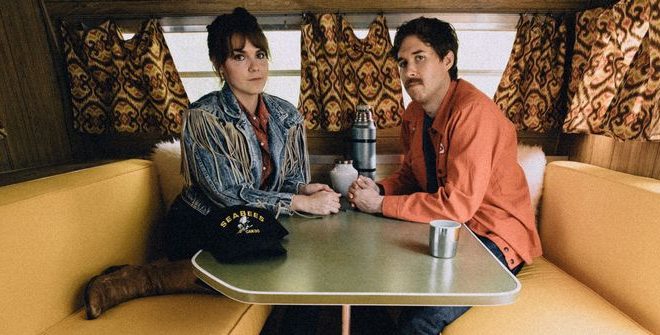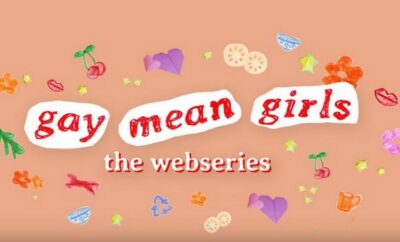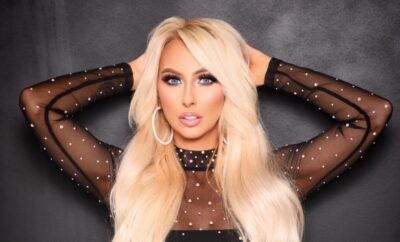
Interviews
Keylee Koop and Micah Sudduth – Home
By: Spring Marie Cullen
Q) I know it was important to you both to create something authentic and lean into the raw story you were looking to create, but was it difficult allowing yourselves to be so vulnerable since these characters are essentially you?
Micah: The process of opening up and revealing to the level that we now do in our work took some time. We didn’t plan on venturing into this kind of filmmaking. We unintentionally always came back to our own experiences as the springboard for stories. It’s what felt the most honest. This doesn’t mean that we are fearless in any way. It just means that we decided to challenge ourselves to become comfortable with the uncomfortable by facing our fears head-on, in various ways. We’ve made active decisions to be vulnerable in front of groups of people again and again, whether through stand up (Micah) or storytelling shows (Keylee). Why? Because that’s what we like to see, that’s what moves us – the truth of others’ experiences. The films and shows that we get most excited about are ones that feel unapologetically truthful – ones that we imagine the writers may have cringed as they wrote them. The more believable the specific narrative is, the more universal its truth becomes.
Keylee: It’s scary to be honest and vulnerable. But that’s where the magic is. We want to give the world our magic, so we are choosing to get over our fears of sharing our true selves and just doing it – awkwardness, flaws, shame, insecurities and all. Because we know that the only way to be heard is to be real, and the more specific we can be with sharing our stories, the more people we can connect with. We enjoy mining our own lives for stories that, through their specificities, explore universal truths about the human condition. Despite the current state of the world, we are all more connected than we think. We all have more in common that we don’t. We all have the same basic needs and we are all experiencing the same types of feelings, even if in extremely different scenarios. We all feel a yearning to belong, a desire to be seen and a longing to be told that we’re enough just the way we are. We feel less alone when others share their stories. We hope to make people feel less alone by sharing ours. And hopefully make them laugh, too.
Q) Which episode was the hardest to film?
Keylee: In episode five, “Home – Grown,” we had a scene that was very challenging to shoot. It was the dinner scene around a table with five characters (Keylee, Micah, Keylee’s mom Kathy, Chris and Lu), on a cold night, in our front yard (we live in a neighborhood in East Hollywood with a lot of helicopters, loud neighbors, etc.) There had to be multiple camera setups to make sure we had coverage of everyone, the eyelines were tricky because of the table and everyone had to be lit individually for their coverage as well. Plus, one of the actors was sick and we had a very short time frame to shoot a lot of pages – maybe seven. But, amazingly, we got it all done and the scene came out great. Yet another testament to our brilliant director of photography Dan Finlayson and the talented cast that gave dope performances.
Micah: Since we didn’t shoot in consecutive order, there was no one episode that was the most challenging. The things that we remember being especially challenging from other scenes during the shoot are scenarios that fall under the producer/director hat. Dealing with difficult locations, not having enough time to get all of the shots or lighting setups we wanted, contending with weather, rescheduling due to actors booking other jobs – you name it. We had to be flexible AF. The performances were never an issue, simply because we didn’t have time to struggle with performances. We shot eight to ten pages a day. We just had to move, which is why we made sure that we had rewritten the script multiple times, hosted multiple readings and had as much rehearsal time with our actors beforehand as possible. Pre-production was key in the success of this show because production was packed with the almost impossible task of essentially shooting a feature film’s length script in ten days at an insane pace. Somehow, we pulled it off. Barely.
Q) Which was the most enjoyable?
Micah: The opening of episode four: “Home – Improvement” was so much fun to shoot. We had a few days of scenes at our house location that were just the two of us, and those were surreal. It felt like magic, finally shooting something we had been working on for so long and getting to act with each other again. We have always wanted to create together, so every time it happens, we feel very grateful.
Keylee: There was something that felt very cathartic about shooting episode four in particular because our characters in the show literally begin with shouting that we believe we are worthless and end the episode shouting that we are fucking unstoppable – all the while our real selves we are smack dab in the middle of the bravest and scariest undertaking we’ve ever attempted. It was meta, it was fun, and it felt incredible. During that scene we began to sense how much we didn’t believe the lie that we were worthless anymore, after working so hard on something we cared about and claiming that we could do what we dreamed of.
Q) I absolutely adored the series and from what I can tell I’m not alone. How does it feel to get such a positive response to your work?
Micah: Creating is the greatest feeling in the world. It’s why we do it. But to put your creation out into the world and have people recognize the passion, effort, heart, and soul that went into it – is beyond what you can ask for. We are grateful more than words can say for all the support we’ve been shown so far, and it touches our hearts to know that something we made resonates with others in such a powerful way.
Keylee: It is so empowering and motivating to know that other people connect with our work. It gives us encouragement and peace – to know that we are not crazy, we are not alone, and we are on the right path.
Q) Was there anything you wanted to include in “Home” that unfortunately had to be cut?
Micah: We wish we had more pages overall, really. The dream is to have had the ability to shoot 6 or even 10 half-hour episodes, but since we were self-funding, we had a very small budget. We worked with so many talented actors in Home and would love the opportunity to spend more time with all of the fun characters that everyone found.
Keylee: Specifically, we would have loved to spend more time with Linda, Shawn, Lu, Chris, and Kathleen (Keylee’s mom) in the first season. We hope to have the funds to build bigger worlds and spend time with even more characters in the future!
Q) Aside from your own personal experiences, where do you find inspiration?
Micah: We find our inspiration from other multi-hyphenates, honestly. They’re making the most exciting television right now, in our opinion. We really enjoy creators like Frankie Shaw, the Duplass Brothers, Issa Rae, Phoebe Waller-Bridge, Donald Glover and Jason Reitman. One thing these creators all have in common is that they all approach their work with such vulnerability, and heart – and you can’t resist laughing or being moved by their projects.
Keylee: Exactly. That’s the kind of work we enjoy and what we want to create.
Q) Are you pulled to one particular facet of filmmaking more than the others, or are you equally interested in acting, writing, and directing?
Keylee: At one point in time, before we started Bob Billiams Productions and embraced becoming writer/director/producers as well as actors, we would have each said that acting was our interest first and foremost. But by leaping out of our comfort zones and challenging ourselves to expand our skillsets and fully own ourselves as filmmakers with something to say and a vision to execute beyond just acting performances, we fell more in love with the whole of filmmaking.
Micah: Now, we want to do it all, from here on out. The dream is to create, write, direct and star in our own TV series and feature films and eventually to collaborate with many other artists we admire, by directing their projects or acting in their creations and even executive producing great content as well. We want to take Bob Billiams Productions to the next level.
Q) Do you have any upcoming projects? Is season two already in the works?
Micah: We are developing a new half-hour dramedy with executive producers Paul Young and Mike Griffin of MAKE GOOD content that we are pumped about. It’s a story that would take us back to rural Texas and dig into more of our religious roots through a comedic, heartfelt and at times absurd lens.
Keylee: We also have a feature film that we are developing that has us really excited, one we hope to shoot in 2020. We would love to make season two of Home and spend some more time in that world, but the truth right now is that we just completely funded season one ourselves and now we are at zero. [laughs]
Q) Do you have any advice for aspiring independent filmmakers?
Micah: There are no rules. Just do it. The most important thing is to focus on making what *you* would like to watch, not what you think other people would like to see. Make the film or series or pilot or scene that is what *you* really want to see. What type of show would you create right now if anything was possible? Make that show. Don’t wait. Show yourself what you’re capable of when you decide to do something, and you do the work it takes to see if to completion. Follow your fear, it usually means you’re about to grow.
Keylee: Focus on the story and project that gets you the most excited, the thing that you know you would binge-watch yourself if you saw it. It’s the only way to make sure that your unique voice comes across. And you’ll find that the more real you are, the more people will relate to you. Authenticity is contagious and being real is so rare nowadays that it feels like magic to people. Do it. Create magic. Make something real. Work hard. Really hard. Don’t settle. Polish it again. Put it out there. Then start over. Just start. Do the thing you want to do. Otherwise, what’s the point of this life anyway?
Q) I admire how open you both are about the ongoing struggles of trying to make it in the industry, what keeps you going when the anxieties and uncertainties start threatening to take over?
Keylee: Going into the arts is not for the faint of heart. Handling the anxiety of putting yourself or your work out there, navigating rejection after rejection and facing the fact that your career is entirely up to you and that no cavalry is ever coming to save you (thanks Mark Duplass for your 2015 SXSW speech on that matter that we listened to on repeat) is a lot for the brain to process, especially in a society that is constantly bombarding you with messages about what’s trending, who’s on top, that ‘likes’ and ‘follows’ matter, that your job or income defines you, that there’s a timeline for success, etc. It’s hard not to be overcome by your insecurities and get stuck in a loop of comparing yourself to others. Sometimes it seems like just existing in this world at this time is enough to give you overwhelming, paralyzing anxiety that can make you feel like you can’t get off the couch and maybe it wouldn’t even matter if you did. We didn’t enjoy sitting in those feelings or listening to those thoughts. We didn’t want to stay on the couch. We wanted to create for ourselves the life that we dreamed of. So, we became obsessed with rewiring our brains and changing our patterns and behaviors.
Micah: We worked hard to essentially, figure out how to better manage our triggers of stress, fear, anxiety, and rejection. The things we have found most helpful are: therapy, meditation, yoga, breathwork, books and podcasts, limiting bad news intake, exercising and other forms of self-care. We are obsessed with rewiring our brains. We will try anything that helps us get off the couch and take action – even if it’s perceived as being lame, like listening to Tony Robbins or reading self-help books. We think everyone should do this. The only people that think stuff like this is lame are people that don’t do anything, that feel like they couldn’t change themselves or their lives if they tried. Don’t listen to them. Prove them wrong. No matter where you are in your life, realize you can begin to change the messages you are receiving. Choose to send yourself positive, healing, empowering messages. The messages you open yourself up to inform your mindset, and your mindset informs your actions.
Keylee: We never would have been able to make our show and put it out there in the world if we hadn’t intentionally sought out sources to help us believe in ourselves and surrounded ourselves with empowering messages while we worked through our struggles. If you’re going to have to pick up dog shit for a while, make sure you’re listening to Oprah while you’re doing it.
Micah: Basically, we do everything we can to avoid becoming cynics. Becoming a cynic will not help you, believing nothing matters anyway is not true, and it will ruin you. Your brain can either be your greatest ally or your biggest enemy. You decide. If you want it to be an ally, you are probably going to have to make a lot of effort to re-train it. It’s worth the work. Who cares what other people think?!
Keylee: We chose to start taking care of ourselves so we could be healthy enough to offer our gifts to the world. We think the world would be a better place if we all did that, so we hope we inspire others to begin taking care of themselves and cultivating the lives of their dreams, too.
Q) Bob Billiams is probably the best name I’ve heard for a production company ever. I know you were going for the strong cowboy (and cowgirl) sound, were there any other names you considered?
Micah: Oddly enough, we can’t remember any other names. Nothing else stuck.
Keylee: We came up with the name Bob Billiams while we were writing Home. I think we were both stoned and sitting on the couch after a long day of day job work and working on the corkboard full of ideas for the show. We knew we needed a name and we thought it would be funny to have one that obviously sounded like a made-up name with no history, but it also sounded important. Bob Billiams just popped up in my head. I said it out loud and we both started laughing uncontrollably. We knew that was the right name right then and there.
WHERE CAN I WATCH? Episodes and can be found here: https://www.bobbilliamsproductions.com/home
Follow on Social Media:
Twitter: https://twitter.com/thebobbilliams
Facebook: https://www.facebook.com/thebobbilliams/
Instagram: https://www.instagram.com/thebobbilliams/





You must be logged in to post a comment Login